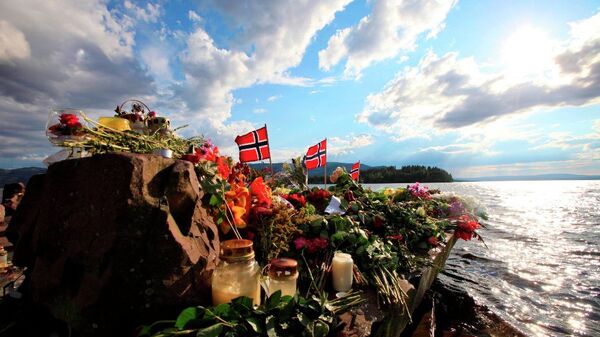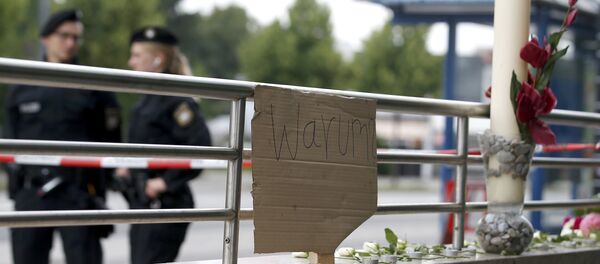Sonboly’s father works as a taxi driver and his mother is engaged in trading business. The shooter was born and raised in Germany. Allegedly he did not manage to establish any friendly relations with his peers, German newspaper Bild am Sonntag reported.
Sonboly suffered from bullying mainly from Turks residing in Germany and contacted the police after having been beaten after a robbery.
Investigators say that the attack in Munich happened exactly five years after the terrorist attack in Norway committed by Anders Breivik.
The victims of the Munich shooting were shot by the same gun that was used by Breivik – a Glock 17.
According to publication Pronedra, the shooter in Munich was keen on reading literature about murder and was also seeing a psychiatrist. There has been no established connection between the shooter and any terrorist organization.
Back in 2011, the world saw the deadliest terror attack by lone gunman Anders Breivik in Norway.
On the afternoon of July 22, 2011, a homemade explosive planted by Breivik was detonated in a van in Oslo’s city center, killing eight people. Right after that, Breivik went on a deadly shooting rampage on the nearby island of Utøya.
Hundreds of teenagers had gathered for a summer camp organized by the Workers’ Youth League when Breivik launched his attack. The majority of his young victims died of a single gunshot wound to the head.
Remembering the 77 victims killed on this day in 2011 in #Oslo and #Utoya by the fascist extremist Anders Breivik 🌹 pic.twitter.com/BtVudHeg5w
— Marisa (@MarisaManUtd) July 22, 2016
It’s five years to the day since #FarRight #terrorist Anders #Breivik killed 77 (mainly young) people in #Norway pic.twitter.com/lJcvvBGSXo
— HOPE not hate (@hopenothate) July 22, 2016
Breivik, a self-declared fascist, was charged with committing acts of mass murder and terrorism in 2012, and given a 21-year prison sentence.
Then, there was the Colorado Batman shooting in 2012 which left people in the US completely stunned.
A figure in a gas mask set off what appeared to have been tear gas bombs about 15 minutes into a midnight showing of The Dark Knight before opening fire on the crowd watching the movie.
For years scientists have wondered what propels people to shoot at strangers at random. Is it a psychological disease? How he was raised? The influence of twisted music, video games or fanatics?
Researchers have been trying to answer these questions for decades but haven't come to a clear conclusion, though they have some leads.
By studying previous incidents, researchers have determined that most mass murderers are men, they tend to spend a lot of time alone and have few friends and they often feel alienated from the rest of the world. They are also depressed, angry and humiliated.
Back in 2012, following the Colorado shooting an assistant professor at Thomas Jefferson University in Philadelphia, Neil S. Kaye, said that the problem with that is that mass killers do this for multiple reasons, and even when you develop a profile of people at risk, 99 percent of them never go out and do anything bad.
Another study by Dietz indicates that the level of news coverage in the US lead to, on average, one more mass murder within two weeks of the first, The Business Insider reported.
“When they watch the coverage of a mass murder, one or two will say — ‘That guy is just like me! That's the solution to my problem.'… They will say this quite openly to you when you interview them. It's a conscious process… The massacre seems to offer them both an escape from their unbearable pain, and an opportunity to punish the people they blame for their plight,” the publication reported.
However, these days it seems that speculation and jumping to conclusions linking attacks to Islamic radicalization is becoming common place.
In his interview with Rossiyskaya Gazeta German expert Alexander Rahr, Research Director of the German-Russian Forum, underscored that the Munich incident could neither be regarded as a radical Islamist action nor as an assault by a German "Anders Breivik" or the Norwegian neo-fascist follower.
"The culprit who shot people in a shopping mall in Munich on Friday was 18 years old. He was a descendant of an Iranian family and was raised in Germany being a representative of second-generation immigrants from that Middle Eastern country. According to the video made at the scene, the shooting was the young man's act of revenge for not being able to integrate into German society. It should be admitted that there is a problem with foreigners' integrating immigrants into German society," Rahr told Rossiyskaya Gazeta.
However, as it was reported earlier, German nationalists and Eurosceptics will most likely pin the blame for recent attacks and any other migrant or terrorism related incidents on Merkel and Brussels' policies.
Rahr also predicted that the country's right-wing parties will jump on the Munich tragedy's bandwagon to target Merkel's migration policy. It might become a serious challenge for centrist parties.
It is nevertheless, important to consider all sides of the story to avoid hasty accusations of government policies or religions.






